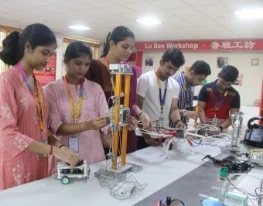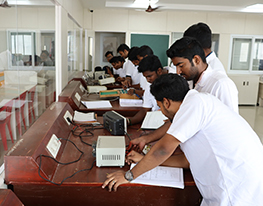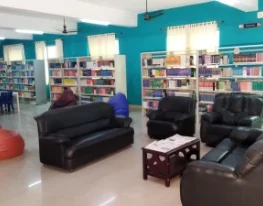Our Vision
To Excel in the emerging areas of Computer Science and Engineering by imparting knowledge, relevant practices and inculcating human values to transform the students as potential resources to contribute innovatively through advanced computing in real time situations.
Our Mission
- To provide strong fundamentals and technical skills for Computer Science applications through effective teaching learning methodologies.
- To transform lives of the students by nurturing ethical values, creativity and novelty to become Entrepreneurs and establish start-ups.
- To habituate the students to focus on sustainable solutions to improve the quality of life and the welfare of the society
- To enhance the fabric of research in computing through collaborative linkages with industry and academia.
- To inculcate learning of the emerging technologies to pursue higher studies leading to lifelong learning.
Program Educational Objectives (PEO)
- PEO 1 : Contribute to the industry as an Engineer through sound knowledge acquired in core engineering to develop new processes and implement the solutions for industrial problems.
- PEO 2 : Establish an organization / industry as an Entrepreneur with professionalism, leadership quality,teamwork, and ethical values to meet the societal needs.
- PEO 3 : Create a better future by pursuing higher education / research and develop the sustainable products / solutions to meet the demand.
Program Specific Outcomes (PSO)
- PSO 1 : Analyze, design and develop solutions in the areas of Business Process Management to build the quality products for industry and social needs.
- PSO 2 : Innovate ideas and solutions for real time problems in the field of Software Engineering and Mobile applications by adapting the emerging technologies and tools.
Program Outcomes
| 1. Engineering knowledge: Apply the knowledge of mathematics, science, engineering fundamentals, and an engineering specialization to the solution of complex engineering problems. |
| 2. Problem analysis: Identify, formulate, review research literature, and analyze complex engineering problems reaching substantiated conclusions using first principles of mathematics, natural sciences, and engineering sciences. |
| 3. Design/development of solutions: Design solutions for complex engineering problems and design system components or processes that meet the specified needs with appropriate consideration for the public health and safety, and the cultural, societal, and environmental considerations. |
| 4. Conduct investigations of complex problems: Use research-based knowledge and research methods including design of experiments, analysis and interpretation of data, and synthesis of the information to provide valid conclusions. |
| 5. Modern tool usage: Create, select, and apply appropriate techniques, resources, and modern engineering and IT tools including prediction and modeling to complex engineering activities with an understanding of the limitations. |
| 6. The engineer and society: Apply reasoning informed by the contextual knowledge to assess societal, health, safety, legal and cultural issues and the consequent responsibilities relevant to the professional engineering practice. |
| 7. Environment and sustainability: Understand the impact of the professional engineering solutions in societal and environmental contexts, and demonstrate the knowledge of, and need for sustainable development. |
| 8. Ethics: Apply ethical principles and commit to professional ethics and responsibilities and norms of the engineering practice. |
| 9. Individual and team work: Function effectively as an individual, and as a member or leader in diverse teams, and in multidisciplinary settings. |
| 10. Communication: Communicate effectively on complex engineering activities with the engineering community and with society at large, such as, being able to comprehend and write effective reports and design documentation, make effective presentations, and give and receive clear instructions. |
| 11. Project management and finance: Demonstrate knowledge and understanding of the engineering and management principles and apply these to one’s own work, as a member and leader in a team, to manage projects and in multidisciplinary environments. |
| 12. Life-long learning: Recognize the need for, and have the preparation and ability to engage in independent and life-long learning in the broadest context of technological change. |
PROGRAM SPECIFIC OUTCOMES
Graduates will be able to
| PSO | PROGRAM SPECIFIC OUTCOMES |
|---|---|
| PSO1 | Analyze, design and develop solutions in the areas of Business Process Management to build the quality products for industry and social needs. |
| PSO2 | Innovate ideas and solutions for real time problems in the field of Software Engineering and Mobile applications by adapting the emerging technologies and tools. |

















 Computer Science & Engineering
Computer Science & Engineering
